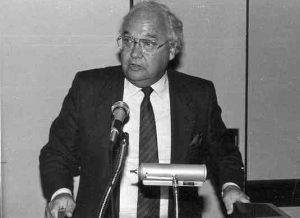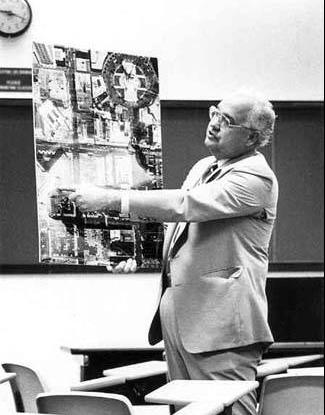
Photo info ...
Credit: University Library, IUPUI via Indiana State LibraryView Source
(Feb. 8, 1935-July 7, 1990). A native of Laconia, Indiana, Conrad graduated from Indiana University School of Law in 1961. Upon graduation, he managed Birch Bayh’s successful U.S. Senate campaign and then served on Bayh’s Washington staff. In this capacity, he became chief counsel for the Senate Judiciary Committee’s Subcommittee on Constitutional Amendments and was an architect of the 25th and 26th amendments. Conrad managed Bayh’s campaign in 1968 and then returned to Indiana to enter politics on his own.

After a failed bid for the Democratic nomination for governor, Conrad successfully ran for secretary of state and moved to Indianapolis in 1970. During his first term, the media uncovered an alleged political manipulation “master plan” and office irregularities. He denied any involvement in a manipulation plan but repaid the state over $7,700 for personal office expenses. Conrad was reelected secretary of state in 1974 but lost the gubernatorial election in 1976 to the incumbent, Otis R. Bowen.
After finishing his second term in 1978, Conrad ostensibly ended his political career and practiced law. In 1979 he joined Melvin Simon and Associates (see ), a retail development firm, as vice president of corporate affairs and chief spokesperson. Through this position, he continued to influence state and local government by advising elected officials.
More importantly for Indianapolis, Conrad became the leading advocate and catalyst for rebuilding the downtown area into a more livable and usable place as well as for developing the city as the nation’s amateur sports capital. He cochaired the (1982) and the (1987), both held in Indianapolis. Simultaneously he became a vital member of many of the city civic and charitable groups on whose boards he served. Some of these organizations included the , Committee for Downtown, , , and Indianapolis Growth Project.
In 1989, with three associates, Conrad left Simon and Associates to form a public affairs consulting and lobbying organization named The Conrad Group. The Conrad Group disbanded the following year upon his death.

Help improve this entry
Contribute information, offer corrections, suggest images.
You can also recommend new entries related to this topic.